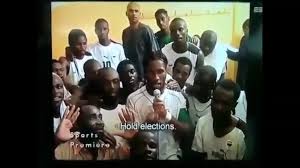A Soccer Match and a War
- Dec 16, 2020
- 3 min read
Updated: Dec 21, 2020
On June 3rd, 2007, the nations of Madagascar and the Ivory Coast played a friendly soccer match. A friendly, or a match that has no bearing on international standings and is not a part of a competition, is essentially a scrimmage. Since these games mean essentially nothing in the larger scheme of world soccer, they usually happen and pass by with no fanfare or importance. This particular match upon first glance was only slightly notable due to the rather lopsided score, with the Ivory Coast winning 5-0 behind great performance from their talisman player, Didier Drogba. Had this match been under normal circumstances, there would be no record of it beyond obscure sites that track the scores of just about every match.
However, this was not a normal match. This match is purported to have had massive repercussions, and an impact that extends far beyond the painted chalk lines of a soccer pitch. This match took place in what was at the time one of the most unstable locales in the world, the northern Ivory Coast in the city of Abidjan. This match ended with soldiers on opposite sides of a war embracing each other and with parades in the streets. Some say this match helped to end a civil war.
As you listen to the podcast feel free to take a look at the images attached below, as they show some of the things covered that are better seen than heard about. Afterwards, take a look at my analysis below.
Here is a link to the podcast audio:
https://soundcloud.com/williambrown2k/a-soccer-match-and-a-war/s-vW9uBJPwsul

Didier Drogba, consider by most to be the best footballer in Ivorian history.
Stills from Drogba's video containing calls for peace after World Cup qualification
The two leaders in the Ivorian Civil War. Exiled former President Laurent Gbagbo (left) and the leader of the rebel faction "The New Forces of Ivory Coast" Guillaume Soro (right).

Drogba being escorted out of the stadium in Abidjan by security forces, with fans supportive of both sides of the war celebrating together in the stands.
This was a story of overblown reporting and the human need to find simple answers to complex questions. We all want a feel-good story, but often the truth is much more complex and nuanced than what we would like to believe. Did Drogba and his Ivorian team help to unite their nation in a time of strife? Probably. Did Drogba and his Ivorian team have an impact on the end of the Ivorian civil war? Most likely not. If they did not exist, the war would have likely ended in the same way it did with their presence.
This is not to say that the actions of these athletes of using their platforms to try and help their communities is useless or unwanted. Instead, this is a cautionary tale about reporting. When we tell ourselves nice stories about how we wish things would have gone, our expectations of the work needed to accomplish loft goals - such as ending a civil war – are set too low. This story is one that should be told, but it is irresponsible to tell it without providing the context and caveats that accompany it as well. While this episode goes contrary to the overall theme that I set out to explore - the idea that our world has examples of connections in places that we would never see on first glance - it is equally vital to analyze this counterfactual: sometimes, the links that we are told exist are often quite flimsy. Without this analysis we could so easily fall victim to manipulation and have our expectations for the complexity of issues such as a civil war lowered, and in turn we might not eb equipped to do the real work necessary to improve the world around us.
So, while there was an Unlikely Connection between a soccer match and the end of a war, but that connection was made posthumously, and we must be aware that not all connections are built on sturdy foundations.









Comments